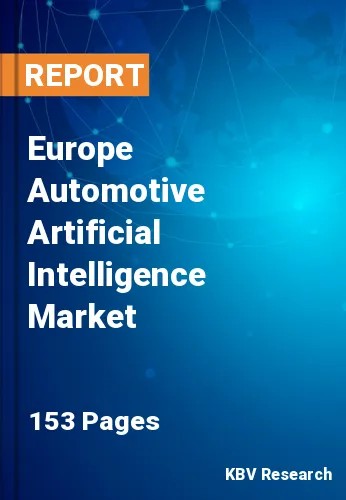The Europe Automotive Artificial Intelligence Market would witness market growth of 20.8% CAGR during the forecast period (2022-2028).
Autonomous driving is among the most potential AI applications in the automobile sector. A lot of businesses are already developing systems for autonomous driving. Such systems employ deep learning to interpret sensor and video data so that the vehicle can drive itself. AI may be utilized to create improved driver support systems in complement to autonomous driving (ADAS). Such systems employ AI to present the driver with data about the automobile and its surroundings and to aid the driver in making important decisions.
In the automobile industry, where incorrectly built components and products may literally be fatal, the quality control stakes are enormous. Changes in lighting, camera movement, and a variety of other mechanical and environmental factors reduce the effectiveness of conventional vision systems. Nevertheless, the power of AI and deep learning has rendered a previously unstable solution resilient and accessible.
The performance of the newest generation of cutting-edge quality control instruments is unaffected by changes in illumination, camera, and/or part location. This not only represents a revolutionary advancement in automated quality control capabilities, but it also enables human quality control professionals to be allocated to more crucial industrial jobs.
Italy is among the most significant motorbike markets in Europe. The Italian two- and three-wheeler industry produces 300,000 units annually and is the top in Europe. Germany's automobile sector and engineering prowess are well-known around the world. Germany is by a considerable margin Europe's top manufacturing and retail market. The nation's top-class R&D infrastructure, seamless integration of the industry's value chain, and highly qualified workforce produce a world-leading automotive environment. It allows businesses to design cutting-edge solutions that properly answer the mobility requirements of the future.
The Germany market dominated the Europe Automotive Artificial Intelligence Market by Country in 2021; thereby, achieving a market value of $487.7 million by 2028. The UK market would showcase a CAGR of 19.8% during (2022 - 2028). Additionally, The France market is anticipated to grow at a CAGR of 21.7% during (2022 - 2028).
Based on Application, the market is segmented into Human–Machine Interface, Driver Monitoring, Autonomous & Semi-autonomous Driving, Identity Authentication, and Autonomous Driving Processor Chips. Based on Process, the market is segmented into Signal Recognition, Image Recognition, and Data Mining. Based on Technology, the market is segmented into Deep Learning, Machine Learning & Computer Vision, Natural Language Processing, and Context- aware Computing. Based on Offering, the market is segmented into Software and Hardware. Based on Component, the market is segmented into Graphics Processing Unit (GPU), Microprocessors (Including ASIC), Field Programmable Gate Array (FPGA), Memory & Storage Systems, Image Sensors, Biometric Scanners, and Others. Based on countries, the market is segmented into Germany, UK, France, Russia, Spain, Italy, and Rest of Europe.
Free Valuable Insights: The Global Automotive Artificial Intelligence Market will Hit $7.5 Billion by 2028, at a CAGR of 21.5%
The market research report covers the analysis of key stake holders of the market. Key companies profiled in the report include Microsoft Corporation, IBM Corporation, Google LLC (Alphabet, Inc.), Intel Corporation, Qualcomm Inc., Nvidia Corporation, Harman International Industries, Inc. (Samsung Electronics Co., Ltd.), Hyundai Motor Company, Mitsubishi Electric Corporation and Tesla, Inc.
By Application
By Process
By Technology
By Offering
By Component
By Country
Our team of dedicated experts can provide you with attractive expansion opportunities for your business.

